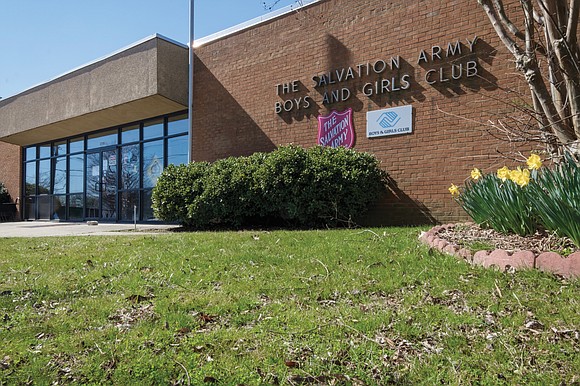Salvation Army Boys and Girls Club becomes temporary shelter for homeless
Jeremy M. Lazarus | 4/2/2020, 6 p.m.
The Salvation Army this week turned its recently renovated Boys and Girls Club in Church Hill into a temporary 75-bed shelter for homeless people.
The club has been closed in recent weeks because of the coronavirus pandemic. The move came as city and nonprofit officials scrambled to find additional space for unsheltered people, including 100 mostly African-American men and women who recently were moved into area hotels and motels for two weeks that are coming to an end.
Many of them came from Cathy’s Camp, a tent encampment in Shockoe Valley that the city recently razed.
Despite the relocation of up to 80 people, the encampment site continues to attract those who have no roof over their heads. Between seven and 12 people continue to sleep on the concrete sidewalks and driveway of the adjacent Annie Giles Community Resource Center on Oliver Hill Way.
The center, which serves as the city’s winter overflow shelter, stays closed except when the temperature is forecast to drop to 40 degrees, as was the case Tuesday night. The shelter then was open from 7 p.m. to 6 a.m. for those who needed a place to stay that night.
The conversion of the Boys and Girls Club at 3701 R St. into a temporary home for those in need is providing relief for other crowded, nonprofit shelters, allowing people considered at higher risk for catching coronavirus to be moved from other sites and freeing up some of their beds for newcomers.
The Salvation Army, which operates a shelter in Downtown for 55 men, women and families, stated in its announcement that people relocated to the Church Hill club would find clean bedding, showers, health care screenings and three daily meals.
While that will help provide more room, more is needed, officials said.
“We are still working to bring on more shelter capacity and to connect people to housing when possible,” wrote Kelly King Horne, executive director of Homeward, the regional coordinating and planning group for the Greater Richmond Continuum of Care for homeless services.
Among other options, Richmond Public Schools has offered two vacant buildings, the Albert V. Norrell Annex in North Side and Clark Springs Elementary School in the near West End, as potential sites to house homeless people for 90 days, it has been learned.
“I don’t think that would be an appropriate use of those buildings,” 2nd District City Councilwoman Kim B. Gray said Tuesday. “Not when we have plenty of other spaces, such as the Richmond Coliseum and the Richmond Convention Center, that are much closer to VCU’s medical facilities and are not in residential areas.”
In a series of text messages, Ms. Horne stated, “We are hoping to reduce” the number of people temporarily housed in motels and hotels “as additional options come online.”
Among the options is permanent housing that is allowing five people to move from a shelter into a home. But there is no expectation that will happen for large numbers of people in shelters given the cost.
Despite the temporary shelter in Church Hill, the space available is being outstripped by demand “from people still sleeping outside and folks calling the homeless crisis line,” as well as those still in hotels, Ms. Horne said.
She stated that the goal is to provide up to 90 days of temporary housing at this point, though she noted “we cannot guarantee the resources. We are working night and day to put resources in place.”
There are hopes, she stated, that the $2.2 trillion federal stimulus bill might provide more resources for the homeless.
City Hall has stepped up as well. “The city provided the funding that allowed the Greater Richmond Continuum of Care to place the 100 people in hotels and help with meals,” according to Reginald M. Gordon, the city’s deputy chief administrative officer for human services.
Mayor Levar M. Stoney created a $2.1 million fund that led to Cathy’s Camp residents being relocated and the camp demolished.
“Now the work has pivoted to a housing plan for each resident. Each resident will be placed in a shelter space or other appropriate housing as soon as possible,” Mr. Gordon stated.
“Some of the residents have already been placed in housing or have gone back home to family,” he continued.
When it comes to the 100 people in hotels and motels and what happens when most are scheduled to check out on Friday, April 3, Mr. Gordon offered assurances they would be taken care of. He stated that the Greater Richmond Continuum of Care would either extend the hotel stays as they work out a housing plan or move them to another location.
Dr. Arlene Simmons, a volunteer who has been tasked by the Continuum of Care to provide meals for 75 people who were relocated to the Rodeway Inn in Henrico County, said she hopes that will be the case. She said hotel stays were extended through Thursday for most, but she has not been advised on what will happen after that for those who remain.
“I am hopeful it will all work out,” she said.






